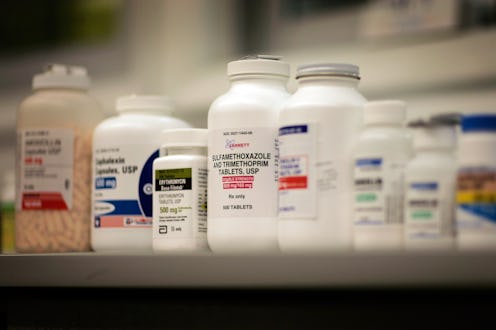News
What You Need To Know About The Bacteria Shigella
The world is a scary place sometimes. There are plenty of things to worry about — life, love, health, politics, the inevitable march of time that will someday claim us all, the full slate. And, sad to say, yet another new thing to prey on our minds was highlighted Thursday. According to the Centers for Disease Control (CDC), there's a new drug-resistant stomach bacteria called Shigella on the rise in the United States, and it's concerning, to say the least.
Shigella isn't new to the world, but is a relatively new phenomenon within the United States. A bacteria that causes aggressive rectal pain, bleeding, and diarrhea, Shigella is the sort of thing that precisely nobody wants to have. As detailed by NPR, it's a hyper-contagious bacterial disease – transmitted through food and water, according to epidemiologist Anna Bowen — and it's being made all the worse by a familiar, huge problem: the rise of antibiotic resistance. According to the CDC, 243 people came down with Shigella throughout the last year, with about one-fifth of sufferers requiring hospital care, but around the world the figures are far worse, somewhere between 80 million to 165 million people suffer from it each year, with 600,000 actually dying as a result.
Of course, it's never a good idea to jump into full-blown panic mode with something like this. Lest we forget, there are countless disease and ailments that tend to grab public attention — remember how worried people were about Ebola spreading to the United States in a major, uncontrolled way? — but with responsible attention to the situation, you can minimize your risks and maintain a calm state of mind. According to Bowen, the best way to avoid Shigella is to wash your hands frequently. This is probably already an ingrained habit for many (I more or less wash reflexively whenever the opportunity arises), but if you're not one of those people, try to pay attention to it.
The real worrying factor here is undoubtedly the drug resistance. It's a dilemma that President Obama himself has acknowledged, carving out $1.2 billion in his most recent budget proposal to address it, and signing an executive order last year signaling the urgency of the situation. Whether or not that money will actually be approved is hard to say, however, with the GOP-controlled Congress as unlikely as ever to back an Obama spending proposal. Given the public health and safety implications of this issue, though, you'd at least hope a case could be pleaded to them.
After all, overuse of antibiotics is allegedly the crux of the problem (though as The New York Times points out, it's also a huge problem in the agricultural sector). As more people use antibiotics, the more bacterial diseases will adapt to the treatments. It's a danger that doctors and researchers have been warning about for decades, and now it's getting very serious, indeed.
